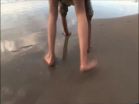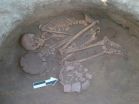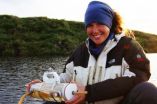(Press-News.org) CHAMPAIGN, Ill. — A survey of 142 men and 516 women with experience in field studies in anthropology, archaeology, geology and other scientific disciplines reveals that many of them – particularly the younger ones – suffered or witnessed sexual harassment or sexual assault while at work in the field.
A majority of the survey respondents (64 percent) said they had experienced sexual harassment (inappropriate sexual remarks, comments about physical beauty or jokes about cognitive sex differences, for example). And more than 20 percent reported they had been the victims of sexual assault (unwanted physical contact of a sexual nature, including touching, physical threats, or rape).
The survey and analysis, reported in the journal PLOS ONE, comes after a preliminary survey offered evidence that many of those engaged in biological anthropology field research – most of them younger women, but also men – were sexually harassed and/or assaulted while conducting field research far from home.
"Our main findings – that women trainees were disproportionately targeted for abuse and felt they had few avenues to report or resolve these problems – suggest that at least some field sites are not safe, nor inclusive," said University of Illinois anthropology professor Kate Clancy, who led the new analysis. "We worry this is at least one mechanism driving women from science."
Study co-authors are Robin Nelson of Skidmore College; Julienne Rutherford of the University of Illinois at Chicago; and Katie Hinde of Harvard University.
The researchers recruited respondents through social media outlets and on websites serving scientific disciplines that involve field research. The respondents filled out an online survey asking them about their educational and professional status, gender, age, and experiences during field studies.
Undergraduate students, graduate students and postdoctoral researchers (all described as "trainees") were more likely than faculty members to report that they had been the recipients of unwanted sexual attention.
"Over 90 percent of women and 70 percent of men were trainees or employees at the time that they were targeted," the researchers wrote about the new research. "Five of the trainees who reported harassment were in high school at the time of the incident."
Female researchers reported most often that they were the targets of researchers who were superior to them in rank – either more-established scientists working on the same sites, or leaders of the research. Males were most often harassed or abused by their peers.
"Previous work by other researchers has shown that being targeted by one's superior in the workplace has a more severe impact on psychological well-being and job performance than when the perpetrator is a peer," Rutherford said. "This suggests that women may be even more burdened by the phenomenon of workplace sexual aggression."
Field research is a required component of a degree in many scientific disciplines, Clancy said.
"Fieldwork is often what stirs the first interest in science in a young person, and research has shown that scientists who do more fieldwork write more papers and get more grants," she said. "We have to pay attention to how people are treated there."
Those who lead field studies are trained to raise and manage funds, follow research protocols and provide logistical support to their teams, but they are rarely trained to manage interpersonal conflicts that might arise in remote locations, Hinde said.
"The discussion that emerges from these results provides an opportunity for our professional communities to come together and effect solutions to improve the experiences of our trainees and colleagues," she said.
Nelson said, "In many instances, participants reported a lack of knowledge regarding institutional policies or appropriate reporting channels when misconduct occurs. These findings suggest that, in effect, many researchers were ill-equipped to advocate for themselves or others in cases of harassment or assault."
"We are the first researchers to characterize the experiences of scientists at field sites, and our findings are troubling," Clancy said. "If you are on constant high alert because you have been harassed or you are at a site where you know it happens regularly, it drains your cognitive reserves and makes you less effective at your job. No one can work well under those conditions, and we can't ask trainees to keep doing so. Field sciences are intellectually impoverished when hostile field sites drive out underrepresented scientists."
INFORMATION:
Editor's notes:
To reach Kate Clancy, call 217-244-1509; email kclancy@illinois.edu.
To reach Robin Nelson, call 518-580-5419; email rnelson1@skidmore.edu.
To reach Julienne Rutherford, call 312-996-1865; email ruther4d@uic.edu.
To reach Katie Hinde, call 617-496-4551; email khinde@fas.harvard.edu.
The paper, "Survey of academic field experiences (SAFE): Trainees report harassment and assault," is available online or from the U. of I. News Bureau.
Sexual harassment and assault are common on scientific field studies, survey indicates
2014-07-16
ELSE PRESS RELEASES FROM THIS DATE:
Potassium supplements may increase survival in patients taking diuretics for heart failure
2014-07-16
PHILADELPHIA—Researchers from the Perelman School of Medicine at the University of Pennsylvania found that patients taking prescription potassium supplements together with loop diuretics for heart failure have better survival rates than patients taking diuretics without the potassium. Moreover, the degree of benefit increases with higher diuretic doses. The team, including senior author Sean Hennessy, PharmD, PhD, associate professor of epidemiology in Penn's Center for Clinical Epidemiology and Biostatistics (CCEB), report their findings in a study published online July ...
Preeclampsia may share cause with disorders such as Alzheimer's
2014-07-16
New research has identified a potential cause of and a better diagnostic method for preeclampsia, one of the most deadly and poorly understood pregnancy-related conditions in the world. The international team, led by researchers at Nationwide Children's Hospital, discovered that the disease may result from a collection of protein mishaps like those associated with Alzheimer's disease. Their findings, released today by Science Translational Medicine, have already led to an affordable, fast and accurate urine test that could revolutionize the diagnosis of preeclampsia in ...
Walking on all fours is not backward evolution, study shows
2014-07-16
VIDEO:
This video is a sample of UTS walking patterns.
Click here for more information.
AUSTIN, Texas -- Contradicting earlier claims, "The Family That Walks on All Fours," a group of quadrupedal humans made famous by a 2006 BBC documentary, have simply adapted to their inability to walk upright and do not represent an example of backward evolution, according to new research by Liza Shapiro, an anthropologist at The University of Texas at Austin.
Five siblings in the family, ...
New study links dredging to diseased corals
2014-07-16
In a world-first study published today, researchers say dredging activity near coral reefs can increase the frequency of diseases affecting corals.
"At dredging sites, we found more than twice as much coral disease than at our control sites," says the lead author of the study, Joe Pollock, a PhD candidate from the ARC Centre of Excellence for Coral Reef Studies (Coral CoE) at James Cook University (JCU) and the Australian Institute of Marine Science (AIMS).
"Corals require both light and food to survive," Pollock explains. "And unfortunately, dredging impacts corals ...
Tooth plaque provides unique insights into our prehistoric ancestors' diet
2014-07-16
This news release is available in French. This news release is available in French. This news release is available in French.
An international team of researchers has found new evidence that our prehistoric ancestors had a detailed understanding of plants long before the development of agriculture.
By extracting chemical compounds and microfossils from dental calculus (calcified dental plaque) from ancient teeth, the researchers were able to provide an entirely new perspective on our ancestors' diets. Their research suggests that purple nut sedge (Cyperus ...
Tooth plaque provides insight into our prehistoric ancestors' diet
2014-07-16
A new study may provide evidence that our prehistoric ancestors understood plant consumption and processing long before the development of agriculture, according to a study published July 16, 2014 in the open-access journal PLOS ONE by Stephen Buckley from University of York and colleagues.
Evidence of plant consumption before the adoption of agriculture is difficult to find; such evidence is meaningful for understanding how much prehistoric people knew about the ecology and potential therapeutic properties of plants. Scientists in this study extracted and analyzed chemical ...
The 'obesity paradox': Cardiovascular mortality lowest among overweight patients
2014-07-16
Rochester, MN, July 16, 2014 – High body mass index (BMI) is associated with multiple cardiovascular diseases. However, emerging data suggest that there is an "obesity paradox," that being overweight may actually protect patients from cardiovascular mortality. Investigators have now confirmed that the risk of total mortality, cardiovascular mortality, and myocardial infarction is highest among underweight patients, while cardiovascular mortality is lowest among overweight patients, according to two reports published today in Mayo Clinic Proceedings.
Currently more than ...
Brain of world's first known predators discovered
2014-07-16
An international team of paleontologists has identified the exquisitely preserved brain in the fossil of one of the world's first known predators that lived in the Lower Cambrian, about 520 million years ago. The discovery revealed a brain that is surprisingly simple and less complex than those known from fossils of some of the animal's prey.
The find for the first time identifies the fossilized brain of what are considered the top predators of their time, a group of animals known as anomalocaridids, which translates to "abnormal shrimp." Long extinct, these fierce-looking ...
One injection stops diabetes in its tracks
2014-07-16
VIDEO:
Salk scientists explain the implications of their latest finding and how the treatment reverses symptoms of type 2 diabetes in mice without side effects.
Click here for more information.
LA JOLLA—In mice with diet-induced diabetes—the equivalent of type 2 diabetes in humans—a single injection of the protein FGF1 is enough to restore blood sugar levels to a healthy range for more than two days. The discovery by Salk scientists, published today in the journal Nature, could ...
Study: Climate-cooling arctic lakes soak up greenhouse gases
2014-07-16
New University of Alaska Fairbanks research indicates that arctic thermokarst lakes stabilize climate change by storing more greenhouse gases than they emit into the atmosphere.
Countering a widely-held view that thawing permafrost accelerates atmospheric warming, a study published this week in the scientific journal Nature suggests arctic thermokarst lakes are 'net climate coolers' when observed over longer, millennial, time scales.
"Until now, we've only thought of thermokarst lakes as positive contributors to climate warming," says lead researcher Katey Walter Anthony, ...





